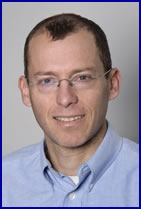FOR IMMEDIATE RELEASE
Renowned scientific computing expert to speak at international life sciences conference on Semantic Web and Big Data in Cambridge, MA
LA JOLLA, CA – Pioneering scientist and best selling author Stephen Wolfram will deliver a keynote talk at next week’s Conference on Semantics in Healthcare and Life Sciences (CSHALS) in Cambridge, MA.
Wolfram is an internationally recognized authority on complex systems and knowledge base computing. His work in the early and mid-1980s focused on understanding complex systems and resulted in discovering important connections between computation and nature. He is the chief designer of the Mathematica technical computing software on workflow applications, and author of the bestseller "A New Kind of Science," first released in 2002 and now freely available online. As president and CEO of Wolfram Research, he launched the Wolfram|Alpha Central Knowledge Engine in 2009 that aims to use computational tools to make the world’s knowledge base accessible to all. His research and software developments continually tackle the specific challenges being addressed by researchers attending the CSHALS meeting: The Semantic Web that promotes common formats for all data on the Web; and Big Data that seeks to manage datasets that have grown too large to work with using common tools and applications.
Wolfram’s keynote is part of a roster of keynote presentations throughout the CSHALS conference from noted scientists, including: knowledge representation and reasoning specialist Rinke Hoekstra of the University of Amsterdam, informatics program director Isaac (Zak) Kohane of Harvard Medical School’s Children’s Hospital, biologist and bioinformatics specialist Barend Mons of the University of Rotterdam and the Leiden University Medical Centre in The Netherlands, and research specialist Chris Welty of IBM’s T.J. Watson Research Center. The conference also features 18 presentations from other invited speakers and those selected through peer reviewed abstract submissions.
About CSHALS
Now in its fifth year, CSHALS, an annual conference of the International Society for Computational Biology (ISCB), is the premier annual event focused on the use of semantic technologies in the pharmaceutical industry, including hospitals/healthcare institutions and academic research labs. This year’s gathering will be held February 23-24 at the Royal Sonesta Hotel in Cambridge, Massachusetts, and includes a pre-conference tutorial and scientific posterreception on February 22nd. For more information visit the conference website at www.iscb.org/cshals2012.
About ISCB
The International Society for Computational Biology is a nonprofit scholarly society dedicated to advancing the scientific understanding of living systems through computation. Based in La Jolla, California, at the San Diego Supercomputer Center on the campus of the University of California, San Diego, the ISCB has a global membership of 3,000 researchers from 70 countries. For more information, visit www.iscb.org.
Press Contact
BJ Morrison McKay
ISCB Executive Officer
+1-760-522-8805
This email address is being protected from spambots. You need JavaScript enabled to view it.




